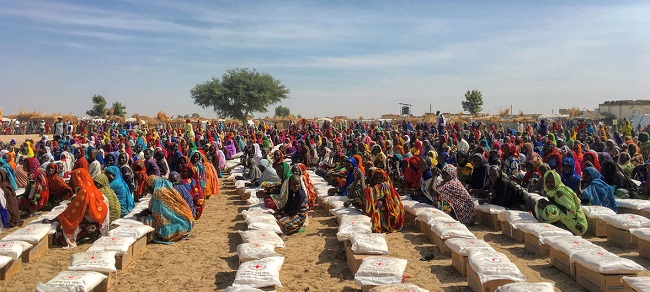The UN Emergency Relief Coordinator, Mr Mark Lowcock, has said that despite improvements in the humanitarian situation in the Lake Chad region, millions continue to remain dependent on life-saving assistance.

The top UN relief chief at the Berlin Conference on the Lake Chad Basin region on Monday, September 3, 2018 urged greater international support for the region to safeguard the progress achieved.
“There is still a big humanitarian crisis. It is not over despite the progress we have made,” Lowcock told a high-level humanitarian conference on the region.
In February, the meeting at a UN-backed conference in Oslo, Norway, donors pledged over $650 million towards emergency assistance programmes in 2017 and beyond.
According to him, these resources helped achieve a significant scale-up in the humanitarian response, reaching more than six million people with assistance, and averting a famine in Northeast Nigeria.
However, he said that humanitarian needs had continued to grow and so do the resources needed to respond.
Of the $1.58 billion required for 2018, only about $600 million or 38 per cent had been received as of July 25, he said.
“The appeal we had on the humanitarian response plan this year has been generously financed but not to the degree where any of us can be comfortable that we can meet the needs of the people we can reach, still less of those we are still trying to reach,” Lowcock said.
The UN humanitarian coordinator urged additional funding and resources.
He noted that no fewer than 10 million people across the four countries – Nigeria, Cameroon, Chad and Niger – remained dependent on assistance.
At the same time relief workers face severe challenges reaching the worst affected due to Boko Haram violence, according to the UN Office for the Coordination of Humanitarian Affairs (OCHA).
Alongside life-saving humanitarian response, addressing the underlying cause is vital to ensure lasting solution to the crisis, the UN relief chief highlighted.
Lowcock noted that there was the need to scale up longer-term resilience and development assistance as well as promoting stabilisation.
“If we can make more progress with peace building, good governance, the creation of jobs and education opportunities and the respect of human rights – we work indeed with the underlying issues and this is what we need to do,” he said.
Organised by OCHA and the UN Development Programme (UNDP) together with the Governments of Nigeria, Germany and Norway, on Sept. 3 to 4 in Berlin, the conference seeks to maintain the momentum from the 2017 Oslo conference and increase and expand international support.
It is expected to reinforce an approach combining the response to immediate humanitarian needs with addressing the root causes of the crisis in a way that leads to sustainable, resilient development.
Education, he says, is one of the sectors desperately needing resources is education, an area that often lacks funds in humanitarian emergencies.
Earlier on Monday, Manuel Fontaine, the Director of Emergency Programmes at UN Children’s Fund (UNICEF), said that where there is insecurity, education can be both life-sustaining and life-saving.
With some 1,000 schools reported to have been closed or rendered non-functional due to violence or unrest across the region, ensuring access education “can be both life-sustaining and life-saving,” Fontaine said.
“Education supports children and young people’s life-long learning. It gives them the necessary skills to build a better future for themselves and their families, and to contribute to peaceful and prosperous communities.
“Yet too often, overall humanitarian education funding is lacking in emergencies,” the UNICEF official said.
UNICEF had called for $41.7 million to meet the education needs of children in the crisis but has received just eight per cent of this amount in the first half of 2018.
Other sectoral priorities for UNICEF include food security and nutrition, emergency shelter and non-food items, protection, health, water, hygiene and sanitation, and early recovery.
By Prudence Arobani
